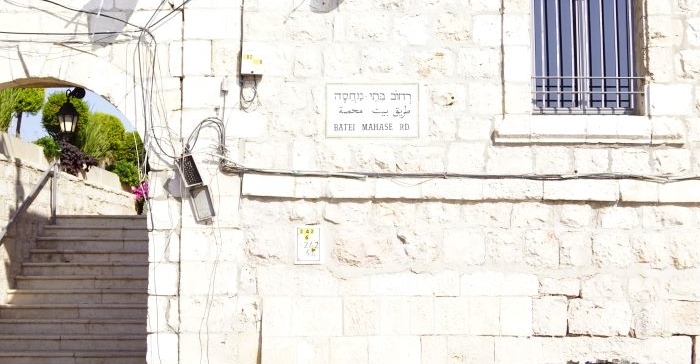RECONSIDERING JEHOIAKIM
by Roger Wyatt | 29th January 2021 | more posts on
'Kings and Prophets'| 0

Photograph: Roger Wyatt - Jerusalem.
In a survey of the kings of Judah, Manasseh, Ahaz and Zedekiah are notable for their wickedness, and their role in bringing about the fall of the kingdom of Judah is well understood. A king less considered in the story of the small kingdom of Judah is Jehoiakim, but a careful look at his life and reign reveals the man to be a true villain. Whilst the fate of Judah and Jerusalem had already been secured by the evil behaviour of Manasseh, Jehoiakim’s political and personal life were also primary causes of the catastrophe that ended the monarchy and brutally hurled the kingdom of Judah into death, desolation and exile.
It was the failure of Josiah perhaps, who orchestrated a significant religious reformation in the early 620s, to ensure he had an heir who was worthy of the throne after he was killed in battle of Megiddo in 609. His firstborn son, Johanan, predeceased his father and it is his youngest son, Jehoahaz (Shallum), who accedes to the throne in the same year. However, the king of Egypt, Necho II, who had just defeated Josiah at Megiddo, is outraged and Jehoahaz is removed from the throne after only three months and replaced by Josiah’s second son Jehoiakim. As such Jehoiakim ruled as a vassal king of Egypt during the first years of his reign.
Little is known about Jehoiakim’s early years as king from the writings of the biblical chroniclers, but some insight into the early reign of the king can be gleaned from the book of Jeremiah. Jeremiah had been prophetically active during the reigns of both Josiah and Jehoahaz, and in Jeremiah 26 we read that he continues his prophetic ministry despite the change of king: ‘Early in the reign of Jehoiakim son of Josiah king of Judah, this word came from the LORD’ (Jeremiah 26:1). Placing the prophecy is, in fact, easier than the vagueness of the English translation allows, for ‘Early in the reign’ is actually יְהוֹיָקִים מַמְלְכוּת בְּרֵאשִׁית (yehowyaqim mamleḵut berešit lit. in the beginning of the reign of Jehoiakim), that is 608. Jeremiah’s message, delivered in the courtyard of the temple, is not well received by those listening, which include priests and prophets determined to stir up trouble for the prophet. The outraged crowd seize Jeremiah with shouts of ‘“You must die!”; it is his message that the house of the LORD will be like Shiloh, and Jerusalem will be left desolate that proves so offensive to those present: ‘And all the people crowded around Jeremiah in the house of the LORD’ (Jeremiah 26:9). Jeremiah had a narrow escape and was saved by some of the ‘elders of the land’ who dissuaded the priests from lynching the prophet there and then. It would prove to be the beginning of a season of continual persecution for Jeremiah.
In the third year of Jehoiakim’s reign, 606, the political realities in the Near East were about to change dramatically. It would be a year that Jehoiakim would not forget. However, before considering what unfolded, two important historical questions need answering. Albeit any answer will remain a matter of some debate.
The first historical difficulty emerges in consideration of the first verse of Daniel: ‘In the third year of the reign of Jehoiakim king of Judah, Nebuchadnezzar king of Babylon came to Jerusalem and besieged it’. The third year of Jehoiakim was 606, and yet, Nebuchadnezzar did not become king until 605, and indeed, there is no explicit historical record, outside of the Hebrew canon, of Nebuchadnezzar’s attack on Jerusalem prior to 597. Most scholars dismiss Daniel 1:1 as either erroneous or attempt to construct an argument for its veracity based on the complexities of when exactly the kings of the ancient world assumed the title of king and officially began their reigns. However, it is hard to get beyond the face value claim of the text, and if Daniel was exiled in 604, as the scholarly consensus maintains, it would in fact be the fifth year of Jehoiakim’s reign and not the third. Moreover, if the next verse of the first chapter of Daniel is read, it alludes to the fact that Jehoiakim himself was taken to Babylon: ‘And the Lord delivered Jehoiakim king of Judah into his hand, along with some of the articles from the temple of God. These he carried off to the temple of his god in Babylonia and put in the treasure house of his god’ (Daniel 1:2). The term ‘into his hand’ בְּיָדוֹ (beyadow) suggests that the king himself was captured, along with treasures from the temple. 2 Chronicles 35:6-7 must therefore represent the same historical moment: ‘Nebuchadnezzar king of Babylon attacked him and bound him with bronze shackles to take him to Babylon. Nebuchadnezzar also took to Babylon articles from the temple of the LORD and put them in his temple there’. Moreover, it seems likely that this was the beginning of the vassalship of Jehoiakim as described in 2 Kings 24:1: ‘During Jehoiakim’s reign, Nebuchadnezzar king of Babylon invaded the land, and Jehoiakim became his vassal for three years’. As such Jehoiakim had not yet reigned independently of either Egypt or Babylon, something that may explain his political rashness in 603.
Whilst Nebuchadnezzar was in Judah, back at the Euphrates Nebuchadnezzar’s father Nabopolassar fought Egyptian forces garrisoned in what had been Neo-Assyrian territory. Necho II understood the time and the opportunity, Nineveh had fallen in 609 and he now believed he could carve out a new Egyptian empire that would include Judah, Lebanon and Syria. It is ordinarily disputed that it was possible for the crown prince Nebuchadnezzar to have been marching on Jerusalem at the same time as his father was engaged with Necho’s armies, and this might be the case had Necho had an iron grip on the territory known, in the Babylonian Chronicles, as ‘Hatti-land’. However, as events would show, the Egyptian army proved to be far from able to maintain their position in the north.
The second serious historical difficulty relates to the date and nature of Jehoiakim’s vassalship. This is generally dated to a later date of c. 601 BCE, a vassalship which ended with Jehoiakim’s rebellion and it is argued, the second attack on Jerusalem by Nebuchadnezzar in 597. However, it is my suggestion that if the text of Daniel is taken at face value, and 606 was the year of Nebuchadnezzar’s initial attack on Jerusalem, it must mean that 606 was the first year of Jehoiakim’s vassalship, and that he was quickly returned to Judah to rule as a subject of Nebuchadnezzar – not an uncommon practice.
In 605 Nebuchadnezzar engages with the Egyptians at the great battle of Carchemish, an ancient city on the banks of the Euphrates, and Necho is defeated. The moment coincided with the death of Nabopolassar, Nebuchadnezzar’s father, and Nebuchadnezzar accedes to the throne in that year. Jehoiakim is probably conspiring against Nebuchadnezzar as early as 604 and it is from that year that the Babylonian king begins a series of campaigns into ‘Hatti-land’; the northern coalition of which Jehoiakim was probably a part, was swept away by the might of the Babylonians. It is during this time that Jeremiah instructs his friend Baruch to write down the words of his prophecies and to go to the temple and read them. It is a dangerous moment for both Baruch and Jeremiah, described in Jeremiah 36, and when the scroll is taken to the king, the reader is given a glimpse into the heart of the man who sat upon the throne of Judah.
The moment is almost Shakespearean and the text of Jeremiah records that Jehoiakim was, ‘sitting in the winter apartment with a fire burning in the firepot in front of him’ (Jeremiah 36:22). The king, perhaps brooding and isolated, famously burns the scroll bit by bit as it is being read to him: ‘Whenever Jehudi had read three or four columns of the scroll, the king cut them off with a scribe’s knife and threw them into the firepot, until the entire scroll was burned in the fire’ (Jeremiah 36:23). The king then orders the arrest of Jeremiah and Baruch but the text records, ‘the LORD had hidden them’ (Jeremiah 36:26). The burning of the scroll of Jeremiah did not however silence the prophet, and Jeremiah is instructed by God to dictate the same words to Baruch to be recorded on another scroll. Along with the creation of a new scroll Jeremiah is given the task of delivering a message to Jehoiakim who is angered by Jeremiah’s message that the king of Babylon was coming to destroy Judah. Jeremiah’s judgement of Jehoiakim is delivered at some unknown point and speaks of the king’s unceremonious end: ‘He will have no one to sit on the throne of David; his body will be thrown out and exposed to the heat by day and the frost by night’ (Jeremiah 36:30).
It is not until Jeremiah 22 however (which can be dated after Jeremiah 36), that we get a true insight into the character of Jehoiakim. Having provided some context, the prophecy develops into a full denouncement of Jehoiakim’s rule, although he is not immediately mentioned: ‘“Woe to him who builds his palace by unrighteousness, his upper rooms by injustice”’ (Jeremiah 22:13). Jehoiakim’s wickedness is a source of great grief and anger to God and verses fifteen to seventeen draw a comparison between righteous Josiah who ‘did what was right and just’ (Jeremiah 22:15) and unrighteous Jehoiakim whose ‘eyes and heart are set only on dishonest gain’. Moreover, the hallmark of Jehoikim’s reign is once again mentioned in verse seventeen and he is condemned by the prophet for ‘shedding innocent blood’. As if to leave the reader in no mistake that Jehoiakim was Jeremiah’s intended audience, the king is mentioned by name in the following verse: ‘Therefore this is what the LORD says about Jehoiakim son of Josiah king of Judah’. What follows is a grim description of Jehoiakim’s coming ignominious death.
The final words concerning Jehoiakim, do not present the picture of a king who had successfully thrown off the yoke of Babylonian oppression, but rather, a man whose intrigues had dramatically failed, and who would face increasing political and even personal isolation:
‘This has been your way from your youth;
you have not obeyed me.
The wind will drive all your shepherds away,
and your allies will go into exile.
Then you will be ashamed and disgraced
because of all your wickedness.’ (Jeremiah 22:20-22)
The events surrounding his death are mysterious, but the dumping of his body outside the walls of Jerusalem is perhaps an indicator that he was betrayed and murdered, by an unknown hand. The immediate dispatch of Babylonian troops to Jerusalem after his death, and the removal of Jehoiakim’s son, Jehoiachin from the throne, suggests an anti-Babylonian conspiracy that Nebuchadnezzar would not tolerate. In the end, Jehoiakim will be remembered for his murderous villainy, his treachery, and his inability to rule his kingdom without foreign interference. As such, he must take his place in the hall of infamous kings of Judah.
